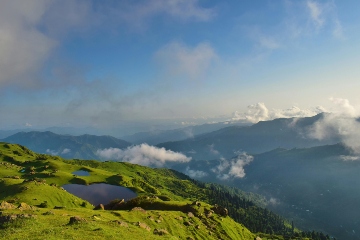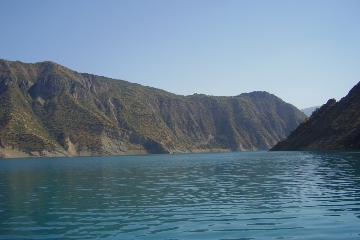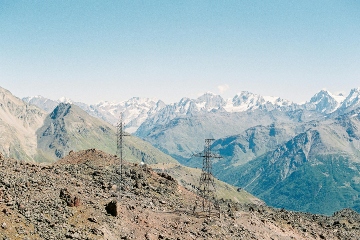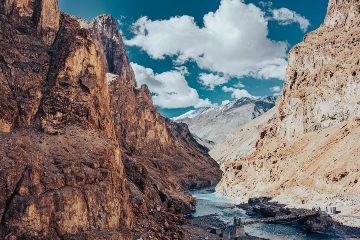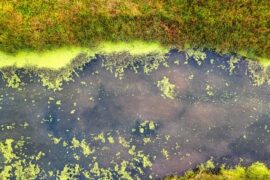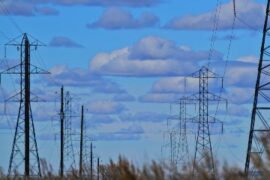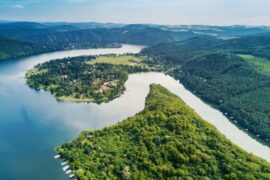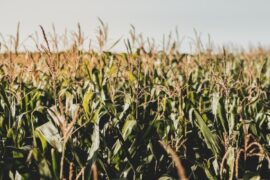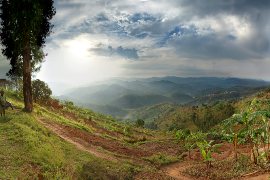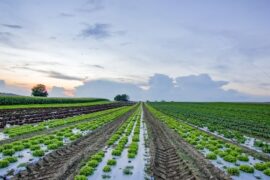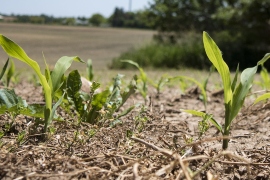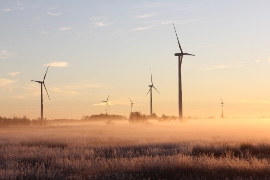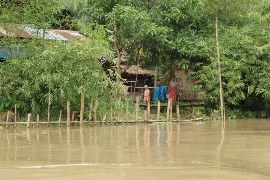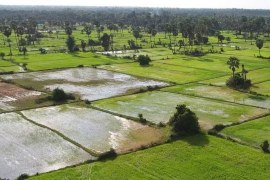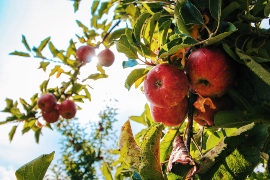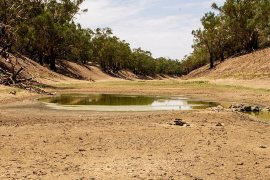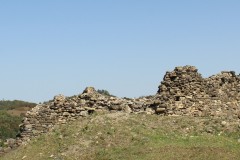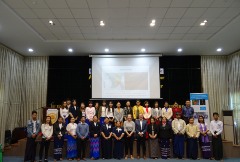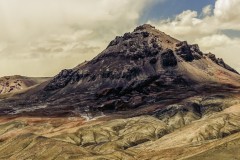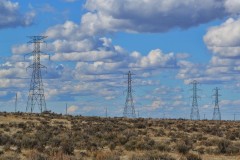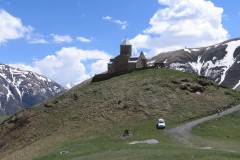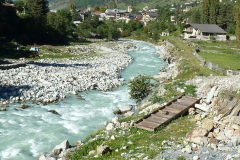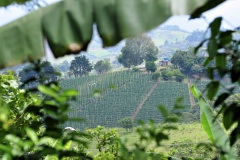Dr. Corjan Nolet is trained as a physical geographer with emphasis on fluvial and aeolian coastal processes. Through his PhD research at Wageningen University he has gained considerable experience in remote sensing techniques and geospatial data analysis. Corjan is an experienced Unmanned Aerial Vehicle (UAV) pilot and is an expert in processing and interpreting UAV-derived data.
His expertise’s include photogrammetric reconstruction software, radiometric and geometric calibration and image classification using machine learning techniques. Corjan has developed and conducted multiple training courses on the use of Google Earth Engine for geospatial analysis and has worked as a researcher / consultant in various international projects. Working in these projects, Corjan has attained valuable skills related to statistical analysis of large spatial climate data sets and interpretation of climate change scenarios on future water resources.
Related projects
-
Climate Risk and Adaptation Assessment for Water and Sanitation Infrastructure in Pakistan
The project aims to modernize water and sanitation infrastructure in Sargodha and DG Khan; thereby addressing environmental degradation, promoting sustainable groundwater use, and reducing public health risks. In collaboration with the Government of Pakistan, the Asian Development Bank (ADB) seeks to establish sustainable, inclusive, resilient, gender-responsive, and low-carbon municipal services...
-
Climate Change Risk Analysis for Rogun Dam
The Rogun HPP is a large project (3,780MW) under construction located on the Vakhsh River located about 110 km East-Northeast of Dushanbe, the capital of Tajikistan. It is a project that will have a large reservoir capable of providing seasonal regulation. It will supply firm energy during the winter months...
-
Climate Risk and Adaptation Assessment for the Electricity Distribution Infrastructure in Pakistan
The project aims to strengthen the existing power transmission and distribution (T&D) system in Pakistan by rehabilitating infrastructure as the country is currently struggling with deteriorating and climate-vulnerable grid infrastructure. As part of the ‘Power Distribution Strengthening Project’, ADB is assisting the government of Pakistan in rehabilitating and modernizing the...
-
Climate Change Adaptation Scoping Assessment for Turkmenistan
The project aims to facilitate the identification and conceptualization of projects focused on climate adaptation, particularly enhancing resilience in Turkmenistan's water and agriculture sectors. This involves creating maps of climate-related hazards to engage with government and development partners. The mapped climate risks will serve as a foundation for discussions on...
-
Springshed Management in the Indian Himalayas
Springs in the Hindu Kush Himalaya (HKH) region are essential for water security, agriculture, economic activities, ecosystem services, biodiversity, and cultural heritage. They sustain nearly 240 million people, including 50 million in India who depend directly on these springs for their water needs. However, almost half of the perennial springs...
-
Nature-based Solutions in the Black Volta Basin: Pre-Feasibility Study
In this project, an analysis is being elaborated that will showcase the potential impact and associated costs of (Nature-based Solutions) NbS to enable effective design and implementation and will support the establishment of sustainable funding mechanisms based on leveraging local beneficiaries.
-
Increasing Investments in Early Warning Systems to Strengthen Climate and Disaster Resilience
This project aims to support the development of a new multi-hazard Early Warning System (EWS) facility, addressing the significant exposure of countries in Asia and the Pacific region to disaster risks. The enhancement of EWS aligns with global commitments, such as the Paris Agreement, Nationally Determined Contributions (NDCs), Sustainable Development...
-
Climate Risk and Adaptation Assessment for the Electricity Distribution Infrastructure in Uzbekistan
Given Uzbekistan’s accelerated economic growth despite the ongoing global challenges, the government aims to maintain the momentum by implementing structural reforms that will stimulate demand and expand the private sector. This includes enhancing the resilience of the power sector with the support of the Asian Development Bank. As part of...
-
Climate Change Impact Modelling Tana Basin, Kenya
FutureWater held for knowledge exchange sessions with the Water Resources Authority responsible for the WEAP model of the Tana Basin. The training focused on how to extract Climate Change data, how to interpret this data, and how to set-it up within the WEAP model.
-
Tailor-made Training on Data-Driven Capacity for Ecosystem Services and Management in Iran
This tailor-made training, funded by Nuffic as part of the Mena Scholarship Programme and requested by The Center for Conservation and Development of Sustainable Ecosystems (ZIPAK) in Iran, focused on providing participants with relevant hands-on experience in tools and techniques to enhance their capacity to manage (protected) ecosystems in Iran.
-
SOS-Water: Water Resources System Safe Operating Space in a Changing Climate and Society
The SOS-Water Project endeavours to set out the boundaries within which the Earth’s capacity to provide life-support systems for humanity is not endangered, and humanity’s capacity to adapt to environmental changes is not overburdened. Crossing such thresholds or tipping points in the complex Earth system could result in abrupt and...
-
Tailor-made Training on Geo-spatial Data Skills Development in Zambia
This tailor-made training, funded by Nuffic and requested by the staff of the The Ministry of Agriculture of the Government of the Republic of Zambia (GRZ), aims to help improving soil water management and crop productivity at the national level. The training focuses on building capacity of participants in accessing...
-
Integrated Strategic Water Resources Planning and Management for Rwanda
Rwanda recently published its “Vision 2050” which sets out the national long-term development strategy, stating new objectives for urbanization, energy production, irrigation and water resources development. The Rwanda Green Fund (FONERWA) in collaboration with the Rwanda Water Resources Board (RWB) with financial support from the World Bank undertakes the consultancy...
-
CREATE: Cross-Border Climate Vulnerabilities and Remote Impacts of Food Systems of the EU, Turkey and Africa
Knowledge and research on cross-border climate vulnerabilities and impacts of a geographic area is still a new topic in scientific literature. Nowadays, climate risk and impact assessments of food-systems focus typically on the production within a geographic area only. Consequently, knowledge and research on the cross-border climate vulnerabilities of food-systems...
-
Tailor-made Training on Climate Smart Irrigation Strategies to Improve Salinity Control and Enhance Agricultural Production
This tailor-made training, funded by Nuffic and requested by the staff of the college of Agriculture of Basra University, aims to help mitigate soil and water salinization problems hampering agricultural production in Iraq. The training focuses on accessing and using innovative data and tools in the public domain, to gain...
-
Renewable Energy for Climate Resilience in Bhutan
The goal of the Asian Development Bank project ‘Renewable Energy for Climate Resilience’ in Bhutan is to diversify Bhutan’s energy portfolio. The rationale for diversification is related to the expectation that climate change impacts on the cryosphere and hydrology in Bhutan will lead to less reliable flows, in particular outside...
-
Tailor-made Training on River Morphology and Flood Risk using State-of-the-Art Open Satellite Data and Processing Tools
The main objective is to enhance the capacity of DWIR staff in using innovative data and tools to analyze water resources and support water management. The training is organized with a very practical approach and strongly built upon the ‘learning-by-doing’ principles. Participants use freely accessible satellite-derived data to gain insight...
-
WAT4CAM: Mekong-Bassac Hydrological and Hydraulic Study
The WAT4CAM program aims to apply IWRM and ISWM principles towards achieving the strategies of the government of Cambodia. This project (WAT4CAM subcompoment 3.1) supports this objective by performing a detailed hydraulic and hydrological modelling study, of which the outcomes will be used in the implementation of Prek rehabilitation works....
-
Determining biomass potential with Lidar point cloud of the Netherlands
This MIT feasibility project investigates the opportunities of an innovation project for determining the biomass potential from local nature management and green maintenance using the publicly available Lidar point cloud of the Netherlands. If the results are positive, this may lead to an innovative logistics support service where producers and...
-
Preventing frost damage in fruit cultivation by thermal imaging with flying sensors
This feasibility project investigates the opportunities of an innovation project for monitoring the effectiveness of wind machines as a frost protection measure in fruit cultivation using flying sensors (drones) equipped with a thermal imager. The results of this feasibility project may lead to an innovative information service to fruit growers...
-
InfoSequia-4CAST: Forecasting and Quantifying Risks of Crop and Water Supply Failures Using Machine Learning and Remote Sensing
InfoSequia-4CAST combines historical and up-to-date observations of satellite-based meteorological and agricultural drought indices with climate variability indices, to generate seasonal outlooks of water supply and crop yield failure alerts. These impact-based indicators are computed using a simple, robust and easily understandable statistical forecasting-modelling framework. By making use of multi-sensor, state-of-the...
-
Climate Risk Assessment East-West Highway Road Project, Georgia
The government of Georgia has requested the assistance of the Asian Development Bank (ADB) to improve the Shorapani–Argveta Road Section F4 of the E60 East-West Highway. The proposed section improvement requires the construction of 12 tunnels (6 double tubes), 14 bridges, 4 interchanges and several deep cuttings and high embankments...
-
Tailor-Made Training for water professionals in Myanmar
This tailor-made training enhanced capacity of Yangon Technological University (YTU) educational staff in using Google Earth Engine to analyse water resources and support water management. Technical staff of Department of Meteorology and Hydrology (DMH) and the Department of Water resources and Improvement of River systems (DWIR) also participated to gain...
-
Climate Risk Assessment CAREC Road Project, Tajikistan
The Obigarm–Nurobod road section of the existing M41 highway, which carries about 3000 vehicles per day, will be inundated once the Rogun HPP reservoir has filled to operating levels. The government of Tajikistan has requested the assistance of the Asian Development Bank (ADB) to construct a 72 km long road...
-
Climate Risk Assessment Energy Distribution Network Modernization Program, Uzbekistan
In consultation with ADB and the project engineers, a rapid climate change assessment for the proposed investment program has been carried out so that the findings of the assessment can be integrated in the project design. The climate assessment focuses on the following issues: (i) screening of natural hazards in...
-
Climate Risk Assessment North-South Corridor Road Project, Georgia
The government of Georgia has requested the assistance of the Asian Development Bank (ADB) and the European Bank for Reconstruction and Development (EBRD) to progressively improve the North–South Corridor by (i) constructing a 23-km two-lane bypass road, (ii) providing adequate safety features and improving geometric alignment and (iii) providing well-designed...
-
Glacio-hydrological assessment for hydropower, Mestiachala river, Georgia
The objective of this project was to develop a hydrological assessment for two potential hydropower plant locations in the Mestiachala basin in Georgia. The availability of observed river discharge data is limited. Hence the assessment was developed based on hydrological simulations of the basin using the SPHY model (Terink et...
-
TWIGA: Transforming Weather Water data into value-added Information services for sustainable Growth in Africa
TWIGA aims to provide actionable geo-information on weather, water, and climate in Africa through innovative combinations of new in situ sensors and satellite-based geo-data. With the foreseen new services, TWIGA expects to reach twelve million people within the four years of the project, based on sustainable business models. The TWIGA...
Related publications
-
2023 - Final Report
Climate Risk Analysis and Prioritisation of Adaptation Measures for the Amu Darya River Basin, Uzbekistan
D. De Condappa, Hunink, J.E., Khanal, S., Nolet, C., Gaffarov, K., Gojenko, B., Muradov, R., Dosmukhamedova, R., Gaipnazarov, N., Iskanov, A., Kholmatjanov, B., Khujakulov, A., Mamarasulov, K., Tursunov, M., Van der Tak, C.
-
2023 - Technical Report
Climate Risk Assessment of Key Agricultural Supply Chains in the 3S and 4P Basins, Cambodia
Simons, G.W.H., C. Nolet
-
2023 - FutureWater Report
Climate Change Risk Mapping of the Amu Darya river basin, Uzbekistan
S. Khanal, Nolet, C., Tursunov, M., Hunink, J.E., de Condappa, D.
-
2023 - FutureWater Technical Report
Climate Risk and Adaptation Assessment for the Electricity Distribution Infrastructure in Uzbekistan
Khanal, S., T. Imran, T., Nolet, C.
-
2023 - FutureWater Report 243
Climate Risk and Adaptation Assessment for Digitize to Decarbonize – Power Transmission Grid Enhancement Project – Uzbekistan
Khanal, S., T. Imran, C. Nolet
-
2023 - Final Report
Integrated Strategic Water Resources Planning and Management for Rwanda
D'Haeyer, B., P. Droogers, J.E. Hunink, C.Nolet, D. de Condappa
-
2023 - FutureWater Report 245
Climate Risk Assessment of Key Crops for the Agri-food Trade Between Europe, Africa, and Turkey
Schults, T., C. Nolet
-
2022 - FutureWater Report 235
InfoSequia-4CAST: Report on InfoSequia Monitor Upgrading
Contreras, S., C. Nolet, S. Khanal, A. Fernández, G.W.H. Simons
-
2021 - FutureWater Report 231
MIT Haalbaarheidsonderzoek: voorkomen van vorstschade in fruitteelt door flying sensors
Cárdenas Niño, N., C. Nolet
-
2021 - FutureWater Report 228
InfoSequia-4CAST: Baseline Design Report
Contreras, S., G. Guimarães, G.W.H. Simons, C. Nolet, J.Beard, S. Khanal, A. Fernández
-
2021 - FutureWater Report 222
Renewable Energy for Climate Resilience in Bhutan – Climate Risk and Adaptation Assessment
Nolet, C., A.F. Lutz.
-
2021 - FutureWater Report 218
Water Productivity Analysis: Irrigation Season 2020 (in Portuguese)
Van Opstal, J.D., M. de Klerk, A. Kaune, C. Nolet, J.E. Beard
-
2021 - FutureWater Report 218
Water Productivity Analysis: Irrigation Season 2020
Van Opstal, J.D., M. de Klerk, A. Kaune, C. Nolet, J.E. Beard
-
2020 - FutureWater Report 221
Bepaling van lokaal biomassapotentieel met de puntenwolk van het Actueel Hoogtebestand Nederland 3
Nolet, C., N. Spliethof
-
2020 - Internship report
Determining the dryness index and evaporative fraction for satellite and drone images
Faassen, K., C. Nolet, S. Contreras
-
2020 - FutureWater Report 212
Monitor Ecopraderas: Seguimiento del estado de las praderas de la Vega del Alagón mediante indicadores de satélite
Contreras, S., C. Nolet, G.W.H. Simons
-
2020 - FutureWater Report 204
Water Productivity Analysis: Rainfed Season 2019-2020
Van Opstal, J.D., M. de Klerk, A. Kaune, C. Nolet, J.E. Beard
-
2019 - FutureWater Report 208
Climate Risk Screening for the Tonle Sap River Basin and the Mekong Delta River Basin, Cambodia
Nolet, C., J. Beard, A. Green, J.E. Hunink, G.W.H. Simons
-
2019 - FutureWater Report 189
TA-9755 GEO: East-West Highway (Shorapani- Argveta Section) Project, Georgia. Climate Risk and Vulnerability Assessment.
Nolet, C., A.F. Lutz
-
2019 - FutureWater Report 187
TA 9530-TAJ: CAREC corridors 2, 3, and 5 (Obigarm–Nurobod) Road Project, Tajikistan. Climate Risk and Vulnerability Assessment.
Nolet, C., A. Kaune
-
2019 - Conference Paper
Flying Sensors for Smallholder Farming: An Innovative Technology for Water Productivity Assessment
Van Opstal, J.D., A. Kaune, C. Nolet, J. van Til, J.E. Hunink
-
2019 - FutureWater Report 188
Glacio-hydrological Assessment for Hydropower, Mestiachala River, Georgia
Kaune, A., C. Nolet, A.F. Lutz
-
2019 - FutureWater Report 182
Climate Risk and Vulnerability Assessment North-South Corridor (Kvesheti-Kobi) Road Project, Georgia
Nolet, C., A.F. Lutz
-
2018 - FutureWater Report
H2020 – TWIGA: WP3 Progress Report
Nolet, C., J. van Til, M. de Klerk

